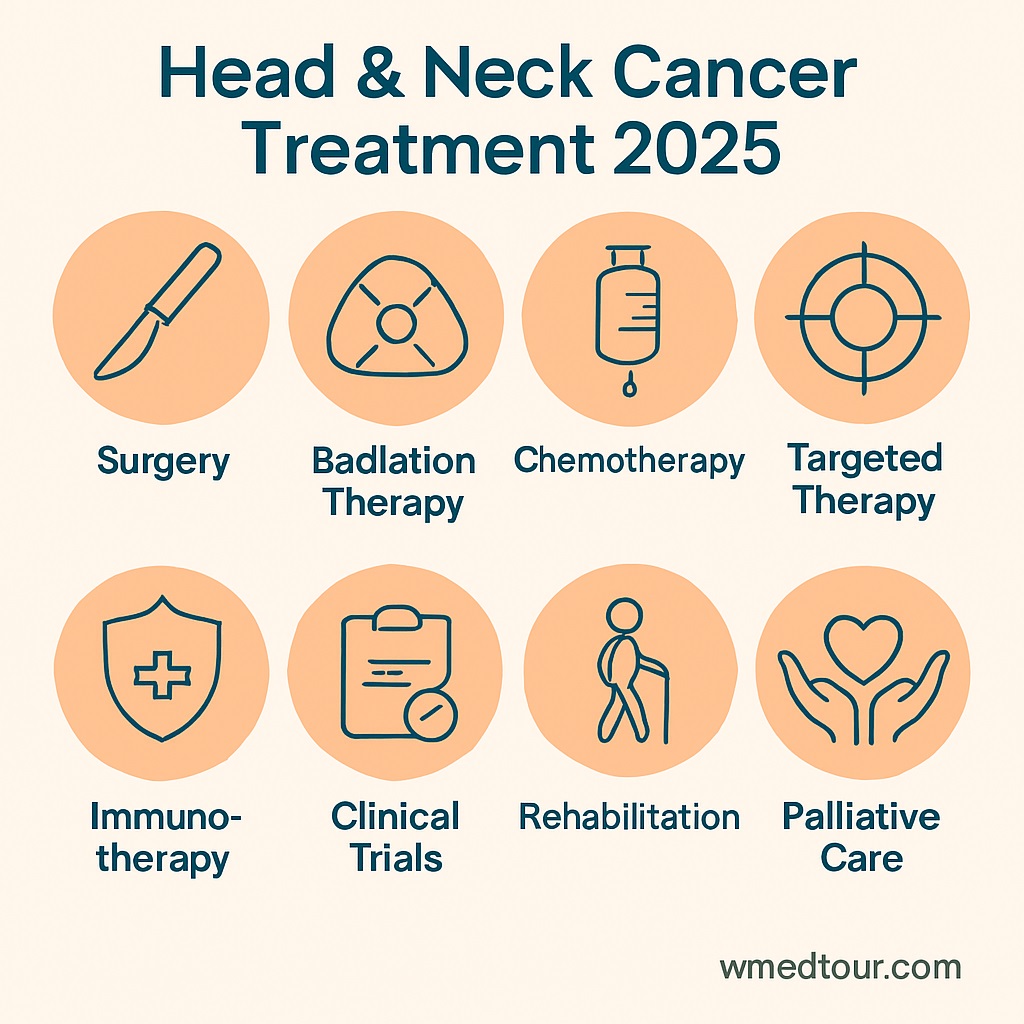Head & Neck Cancer Treatment 2025: Advanced Therapies & Options
Navigating the Latest Options for Comprehensive Care
The field of oncology is consistently advancing, and therefore, understanding the latest options for **Head & Neck Cancer Treatment 2025** is essential. The new landscape of care offers more targeted and effective solutions than ever before. To clarify, modern treatment focuses not only on eliminating the cancer but also on preserving vital functions like speech, swallowing, and appearance.
Furthermore, a multidisciplinary approach is now the gold standard. It combines the expertise of surgeons, oncologists, and other specialists to create a personalized plan for each patient. This guide will provide an overview of the latest developments and how they are shaping the future of head and neck oncology.
Innovations in Head and Neck Oncology
As we move through 2025, the strategies for fighting head and neck cancer continue to evolve dramatically. While surgery, radiation, and chemotherapy remain foundational, newer targeted therapies and immunotherapies are revolutionizing care. In fact, these innovative approaches are designed to be more precise, which consequently reduces harm to healthy cells. This leads to a higher quality of life for patients during and after their treatment.
For instance, targeted therapy uses drugs that specifically attack cancer cells with certain genetic markers. This personalized approach is a game-changer because it allows doctors to select the most effective drugs for a patient’s unique tumor profile. In addition, immunotherapy works by harnessing the body’s own immune system to fight the cancer. These treatments can be especially effective for specific types of head and neck cancers, and in turn, offer long-lasting control of the disease for many patients.
Surgical Advancements: Precision and Preservation
Surgical techniques for head and neck cancer have also made incredible strides. For example, Transoral Robotic Surgery (TORS) has become a popular option for tumors in the throat and base of the tongue. This minimally invasive technique uses robotic arms to navigate and operate in tight spaces with exceptional precision. Consequently, it often leads to less pain, a shorter hospital stay, and a faster recovery.
Similarly, a focus on reconstructive surgery has become paramount. After all, the goal is not just to remove the tumor but to restore the patient’s appearance and function. Therefore, microsurgical techniques, which involve transplanting tissue from other parts of the body, are now used routinely to rebuild the affected area. This allows patients to return to a more normal life more quickly.
Radiation & Chemotherapy: Smarter, Safer Options
While traditional radiation and chemotherapy are still critical components of **Head & Neck Cancer Treatment 2025**, they have been refined to be more effective and less toxic. To illustrate, a significant advancement is Intensity-Modulated Radiation Therapy (IMRT), which delivers radiation in a more targeted way, conforming to the shape of the tumor. Consequently, this reduces damage to surrounding healthy tissue and lowers the risk of long-term side effects such as dry mouth or difficulty swallowing.
Another major step forward is Proton Therapy. In contrast to traditional radiation, proton therapy uses charged particles to deliver a highly precise dose of radiation that stops at the tumor. This means virtually no radiation exposure to the tissue beyond the tumor. This technology is particularly beneficial for treating tumors in sensitive areas of the head and neck, such as near the brain stem or optic nerves.
Navigating Your Treatment Journey: A Comparison
Choosing the right **head and neck cancer treatment** can be overwhelming. To simplify your decision, here is a comparison of some of the most common therapies available today. Each option has its own benefits and considerations. It is best to discuss these with your medical team to find the best fit for your specific condition.
| Treatment Type | How It Works | Key Benefit | Considerations |
|---|---|---|---|
| Surgery | Physically removes the tumor and affected tissue. | Immediate tumor removal, especially for early stages. | Potential for functional and cosmetic changes. |
| Radiation Therapy | Uses high-energy beams to kill cancer cells. | Precise, non-invasive, can spare critical organs. | Can cause side effects like dry mouth or skin changes. |
| Chemotherapy | Uses drugs to kill fast-growing cancer cells throughout the body. | Targets both primary tumors and distant metastases. | Systemic side effects like nausea and fatigue. |
| Immunotherapy | Boosts the body’s immune system to recognize and attack cancer. | Can offer a durable, long-term response. | Not effective for all types of cancer. |
| Targeted Therapy | Attacks specific molecular pathways in cancer cells. | Fewer side effects than chemo; highly personalized. | Requires specific genetic markers in the tumor. |
Comprehensive Care Beyond the Hospital
Effective **Head & Neck Cancer Treatment 2025** is about more than just medical procedures; it’s also about a holistic approach to care. As a matter of fact, many patients benefit from rehabilitation, including speech and swallowing therapy, to regain function after treatment.
For this reason, a dedicated team of dietitians and nutritionists is also essential. They help patients manage dietary changes and maintain a healthy weight. Furthermore, psychological support and counseling can help patients and their families cope with the emotional challenges of a cancer diagnosis. Ultimately, the best results come from a team-based approach that addresses every aspect of a patient’s well-being.
Understanding The Latest Research
The field of oncology is always changing. Researchers at institutions like the National Cancer Institute and the Mayo Clinic are constantly working on new therapies and technologies. Furthermore, clinical trials provide access to cutting-edge treatments that may not yet be widely available. You can stay informed about the latest research and ongoing trials at sites like ClinicalTrials.gov.
Your Journey to Recovery Starts Here
The journey through a **head and neck cancer treatment** is unique for every individual. While the options can seem overwhelming, having the right information and a supportive team makes all the difference. For more information on finding a qualified team and exploring international treatment options, visit wmedtour.com. You can also explore our other resources, such as articles on lung cancer treatment in Iran or cancer treatment in Turkey.
Frequently Asked Questions About Head & Neck Cancer Treatment 2025
Here are some of the most common questions people have about **Head & Neck Cancer Treatment 2025**.
Are you ready to explore your options for Head & Neck Cancer Treatment 2025?




